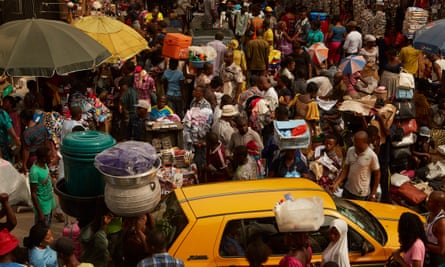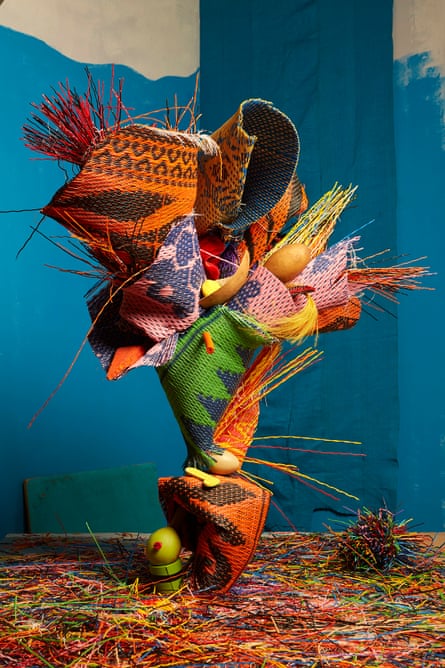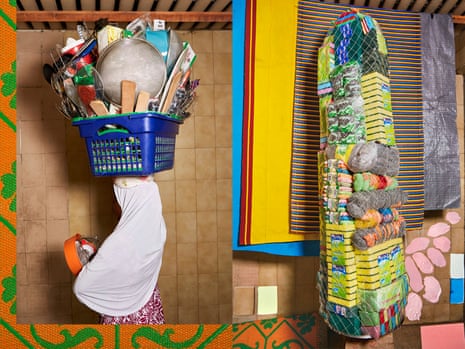During a trip to Lagos in 2014, Lorenzo Vitturi visited Balogun market for the first time. “I knew it was one of the biggest street markets in Africa,” he says, “but nothing prepared me for how overwhelming it was. The crowds of people on the narrow streets, the products on display, the noise, the colour, the chaotic energy. I knew I had to take photographs there, amid the sensory overload of what is, in effect, a city within a city, with tens of thousands of people passing through it every day.”
What most fascinated Vitturi was the contrast between the human drama of the vast, sprawling market and the eerie emptiness of the 27-storey brutalist office block that loomed over it. Built in 1987, Financial Trust House was once the thriving hub of Nigeria’s financial sector. But as the market grew inexorably around it, the bankers and traders moved elsewhere. “Save for the owner’s office, all 27 floors are empty,” says Vitturi. “The real estate value of the building has fallen dramatically, but he is still holding out for some kind of miraculous redevelopment.”
Three years on, Vitturi has created a dramatic photobook that captures the curious dynamic of Balogun market: the cacophonous streets and the silent semi-derelict building. In 2014, in his acclaimed book Dalston Anatomy, Vitturi captured the edginess of Ridley Road market in London’s east end as it held out against gentrification. Money Must Be Made is a similarly imaginative evocation of a place that defies straight documentary.

Instead, Vitturi has applied the same hybrid approach: ornate, posed studio portraits of locals are juxtaposed with striking laser-cut collages and sculptural installations made from the brightly coloured products on sale: plastic buckets, woven mats, chairs, hats, bowls, beads, umbrellas, footballs and fabrics of every hue. Here and there, we are given a glimpse of a bustling street, with garish products filling the frame and objects piled high in teetering pyramids, as people jostle for space in the cut-and-thrust of street-level Darwinian capitalism.
Venice-born Vitturi, who now lives in London, is a graduate of Fabrica, the Benetton-funded visual research centre in Treviso. He worked as a set painter for Tinto Brass, the Italian director of such “erotic” films as Caligula, and at Rome’s legendary Cinecittà Studios.
Vitturi describes his images as “posed but not overly staged”. In Lagos, unable to find space to shoot amid the swirl of the market, he isolated his subjects in a makeshift outdoor studio in the courtyard of the office block. Their often ornate styles of dress and the objects they carry become part of an elaborate human sculpture, a metaphor for the market itself.
“These people have to survive by their creativity as well as their entrepreneurial skills,” says Vitturi. “Every day, the sellers construct these extraordinary sculptures, using a limited space to pile up their wares in the most precarious ways. There is so much creativity in such a compressed space. The results are often close to my own aesthetic. That was something I wanted to reflect in the book.”

The only breathing space in the ongoing dazzle of colour comes in the middle section, in which Vitturi shifts his gaze – and his approach – to the ghostly interior of Financial Trust House. Suddenly we are in a world of monochrome greyness: rooms filled with the detritus of a once-thriving place; discarded corporate signs and computer parts covered, like everything inside the building, in a layer of Saharan sand. The vivid human drama outside seems a world away from the Ballardian atmosphere within, where an aura of postapocalyptic emptiness prevails.

“It struck me early on that the place was almost the opposite of Ridley Road,” says Vitturi, “not just in scale, but in the sense that the street traders in Balogun are not just resisting gentrification, but had defeated it by expanding to meet the demands of their customers.”
The subtext of Money Must Be Made is even more complex than that, though. Nearly all the goods now sold in Balogun are cheap imports from China. “Even the traditional Nigerian fabrics have been copied and are being sold back to the people who originally created them,” says Vitturi. “Virtually everything I picked up had a label that read, ‘Made in China.’ In Balogun, you are confronted with the unstoppable surge of global capitalism.”
What made him choose such a brutally descriptive title? “Money Must Be Made was one of several quotes I selected from the interviews I did with traders. I hired a local calligrapher to paint the words on to a flag made of traditional Nigerian fabrics. It summed up the ethos of the market. Balogun is a place where nothing is wasted. The level of recycling is incredible. Everything has a value. One guy said to me, ‘If you shit here, I will find a way to make money out of it.’ That really summed up their resourcefulness, but it didn’t really work as a book title.”
